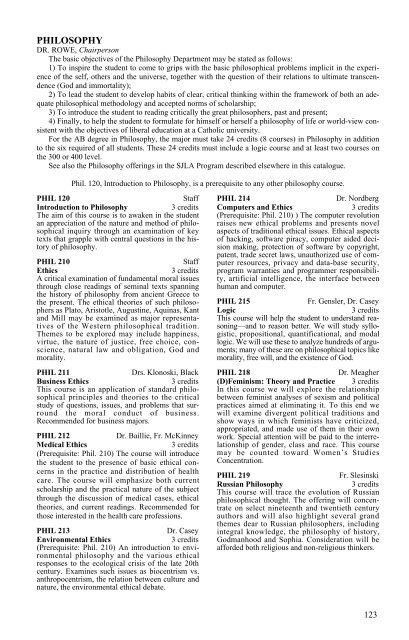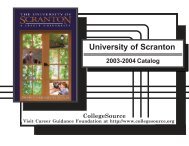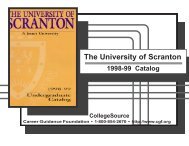Create successful ePaper yourself
Turn your PDF publications into a flip-book with our unique Google optimized e-Paper software.
PHILOSOPHY<br />
DR. ROWE, Chairperson<br />
<strong>The</strong> basic objectives <strong>of</strong> the Philosophy Department may be stated as follows:<br />
1) To inspire the student to come to grips with the basic philosophical problems implicit in the experience<br />
<strong>of</strong> the self, others and the universe, together with the question <strong>of</strong> their relations to ultimate transcendence<br />
(God and immortality);<br />
2) To lead the student to develop habits <strong>of</strong> clear, critical thinking within the framework <strong>of</strong> both an adequate<br />
philosophical methodology and accepted norms <strong>of</strong> scholarship;<br />
3) To introduce the student to reading critically the great philosophers, past and present;<br />
4) Finally, to help the student to formulate for himself or herself a philosophy <strong>of</strong> life or world-view consistent<br />
with the objectives <strong>of</strong> liberal education at a Catholic university.<br />
For the AB degree in Philosophy, the major must take 24 credits (8 courses) in Philosophy in addition<br />
to the six required <strong>of</strong> all students. <strong>The</strong>se 24 credits must include a logic course and at least two courses on<br />
the 300 or 400 level.<br />
See also the Philosophy <strong>of</strong>ferings in the SJLA Program described elsewhere in this catalogue.<br />
Phil. 120, Introduction to Philosophy, is a prerequisite to any other philosophy course.<br />
PHIL 120 Staff<br />
Introduction to Philosophy 3 credits<br />
<strong>The</strong> aim <strong>of</strong> this course is to awaken in the student<br />
an appreciation <strong>of</strong> the nature and method <strong>of</strong> philosophical<br />
inquiry through an examination <strong>of</strong> key<br />
texts that grapple with central questions in the history<br />
<strong>of</strong> philosophy.<br />
PHIL 210 Staff<br />
Ethics 3 credits<br />
A critical examination <strong>of</strong> fundamental moral issues<br />
through close readings <strong>of</strong> seminal texts spanning<br />
the history <strong>of</strong> philosophy from ancient Greece to<br />
the present. <strong>The</strong> ethical theories <strong>of</strong> such philosophers<br />
as Plato, Aristotle, Augustine, Aquinas, Kant<br />
and Mill may be examined as major representatives<br />
<strong>of</strong> the Western philosophical tradition.<br />
<strong>The</strong>mes to be explored may include happiness,<br />
virtue, the nature <strong>of</strong> justice, free choice, conscience,<br />
natural law and obligation, God and<br />
morality.<br />
PHIL 211 Drs. Klonoski, Black<br />
Business Ethics 3 credits<br />
This course is an application <strong>of</strong> standard philosophical<br />
principles and theories to the critical<br />
study <strong>of</strong> questions, issues, and problems that surround<br />
the moral conduct <strong>of</strong> business.<br />
Recommended for business majors.<br />
PHIL 212 Dr. Baillie, Fr. McKinney<br />
Medical Ethics 3 credits<br />
(Prerequisite: Phil. 210) <strong>The</strong> course will introduce<br />
the student to the presence <strong>of</strong> basic ethical concerns<br />
in the practice and distribution <strong>of</strong> health<br />
care. <strong>The</strong> course will emphasize both current<br />
scholarship and the practical nature <strong>of</strong> the subject<br />
through the discussion <strong>of</strong> medical cases, ethical<br />
theories, and current readings. Recommended for<br />
those interested in the health care pr<strong>of</strong>essions.<br />
PHIL 213 Dr. Casey<br />
Environmental Ethics 3 credits<br />
(Prerequisite: Phil. 210) An introduction to environmental<br />
philosophy and the various ethical<br />
responses to the ecological crisis <strong>of</strong> the late 20th<br />
century. Examines such issues as biocentrism vs.<br />
anthropocentrism, the relation between culture and<br />
nature, the environmental ethical debate.<br />
PHIL 214 Dr. Nordberg<br />
Computers and Ethics 3 credits<br />
(Prerequisite: Phil. 210) ) <strong>The</strong> computer revolution<br />
raises new ethical problems and presents novel<br />
aspects <strong>of</strong> traditional ethical issues. Ethical aspects<br />
<strong>of</strong> hacking, s<strong>of</strong>tware piracy, computer aided decision<br />
making, protection <strong>of</strong> s<strong>of</strong>tware by copyright,<br />
patent, trade secret laws, unauthorized use <strong>of</strong> computer<br />
resources, privacy and data-base security,<br />
program warranties and programmer responsibility,<br />
artificial intelligence, the interface between<br />
human and computer.<br />
PHIL 215 Fr. Gensler, Dr. Casey<br />
Logic 3 credits<br />
This course will help the student to understand reasoning—and<br />
to reason better. We will study syllogistic,<br />
propositional, quantificational, and modal<br />
logic. We will use these to analyze hundreds <strong>of</strong> arguments;<br />
many <strong>of</strong> these are on philosophical topics like<br />
morality, free will, and the existence <strong>of</strong> God.<br />
PHIL 218 Dr. Meagher<br />
(D)Feminism: <strong>The</strong>ory and Practice 3 credits<br />
In this course we will explore the relationship<br />
between feminist analyses <strong>of</strong> sexism and political<br />
practices aimed at eliminating it. To this end we<br />
will examine divergent political traditions and<br />
show ways in which feminists have criticized,<br />
appropriated, and made use <strong>of</strong> them in their own<br />
work. Special attention will be paid to the interrelationship<br />
<strong>of</strong> gender, class and race. This course<br />
may be counted toward Women’s Studies<br />
Concentration.<br />
PHIL 219 Fr. Slesinski<br />
Russian Philosophy 3 credits<br />
This course will trace the evolution <strong>of</strong> Russian<br />
philosophical thought. <strong>The</strong> <strong>of</strong>fering will concentrate<br />
on select nineteenth and twentieth century<br />
authors and will also highlight several grand<br />
themes dear to Russian philosophers, including<br />
integral knowledge, the philosophy <strong>of</strong> history,<br />
Godmanhood and Sophia. Consideration will be<br />
afforded both religious and non-religious thinkers.<br />
123
















